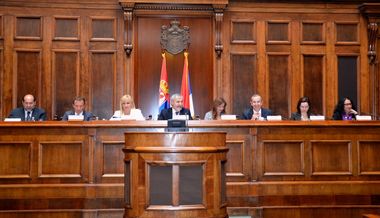 The director of the Office for Human and Minority Rights of the Government of the Republic of Serbia, Suzana Paunović, speaking at the session of the Council for Human and Minority Rights and Gender Equality of the National Assembly of the Republic of Serbia dedicated to marking the International Roma Day – “Inclusion of Roma 2014/15: Results and Challenges” noted the dedication of the Government of the Republic of Serbia to improving the status of the Roma national minority and stated that institutional capacities have been strengthened and mechanisms have been established to follow the progress in the area of Roma inclusion.
The director of the Office for Human and Minority Rights of the Government of the Republic of Serbia, Suzana Paunović, speaking at the session of the Council for Human and Minority Rights and Gender Equality of the National Assembly of the Republic of Serbia dedicated to marking the International Roma Day – “Inclusion of Roma 2014/15: Results and Challenges” noted the dedication of the Government of the Republic of Serbia to improving the status of the Roma national minority and stated that institutional capacities have been strengthened and mechanisms have been established to follow the progress in the area of Roma inclusion.
Coordination was also established between state institutions and the civil sector, and a very important role in monitoring the measures envisaged by the Strategy for Improving the Status of Roma, but also in planning policies aimed at members of the Roma national minority, is held by the activities of the Council for Improving the Status of Roma of the Government of the Republic of Serbia, she noted. As the most important activity in this period, she listed drafting the new strategy for improving the status of Roma by 2025.
The head of the European Union Delegation to Serbia, Michael Davenport, commended the efforts of the Government of the Republic of Serbia in drafting a new Strategy for Roma Inclusion, since it will contain all required measures and activities that will impact the improvement of the status of citizens of Roma nationality.
The ambassador of the OSCE Mission to Serbia, Peter Burkhard noted that the OSCE Mission will continue providing support to the Republic of Serbia in achieving changes in the quality of life of members of the Roma national minority.
The director of the UN Entity for Gender Equality and Empowerment of Women (UN Women), Asya Varbanova, noted the large inequality between men and women, particularly reflected on members of the Roma national minority.
The best students of the Roma national minority were presented laptop computers as acknowledgement for their success in their studies, in order to provide them with support to continue education.
The Council session was also attended by representatives of the National Council of the Roma National Minority, state bodies and institutions, independent bodies, international organizations and Roma civil society organizations.
Source: www.srbija.gov.rs
 Government of the Republic of Serbia
Government of the Republic of Serbia















 pdf [271 KB]
pdf [271 KB]
Leave a Comment